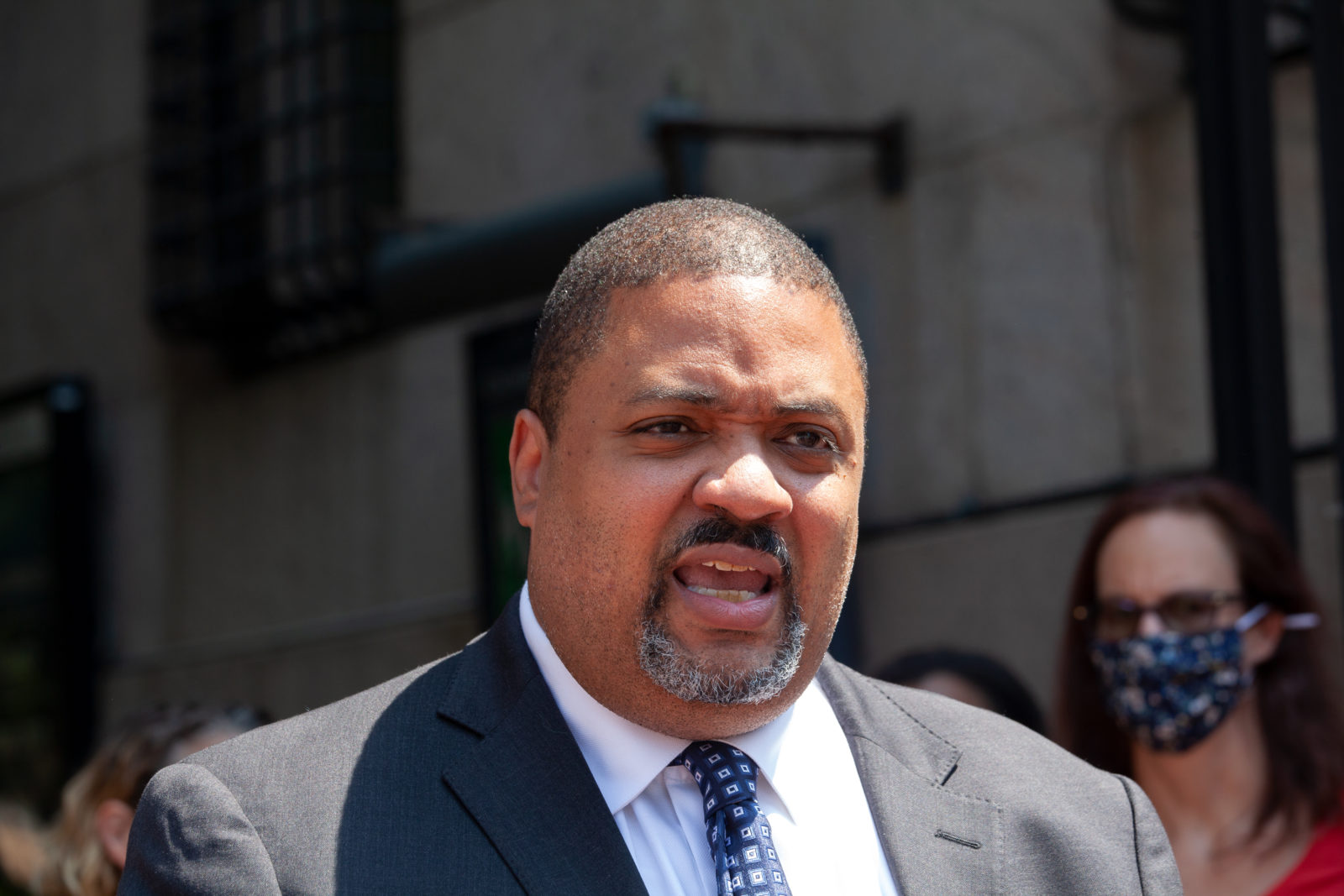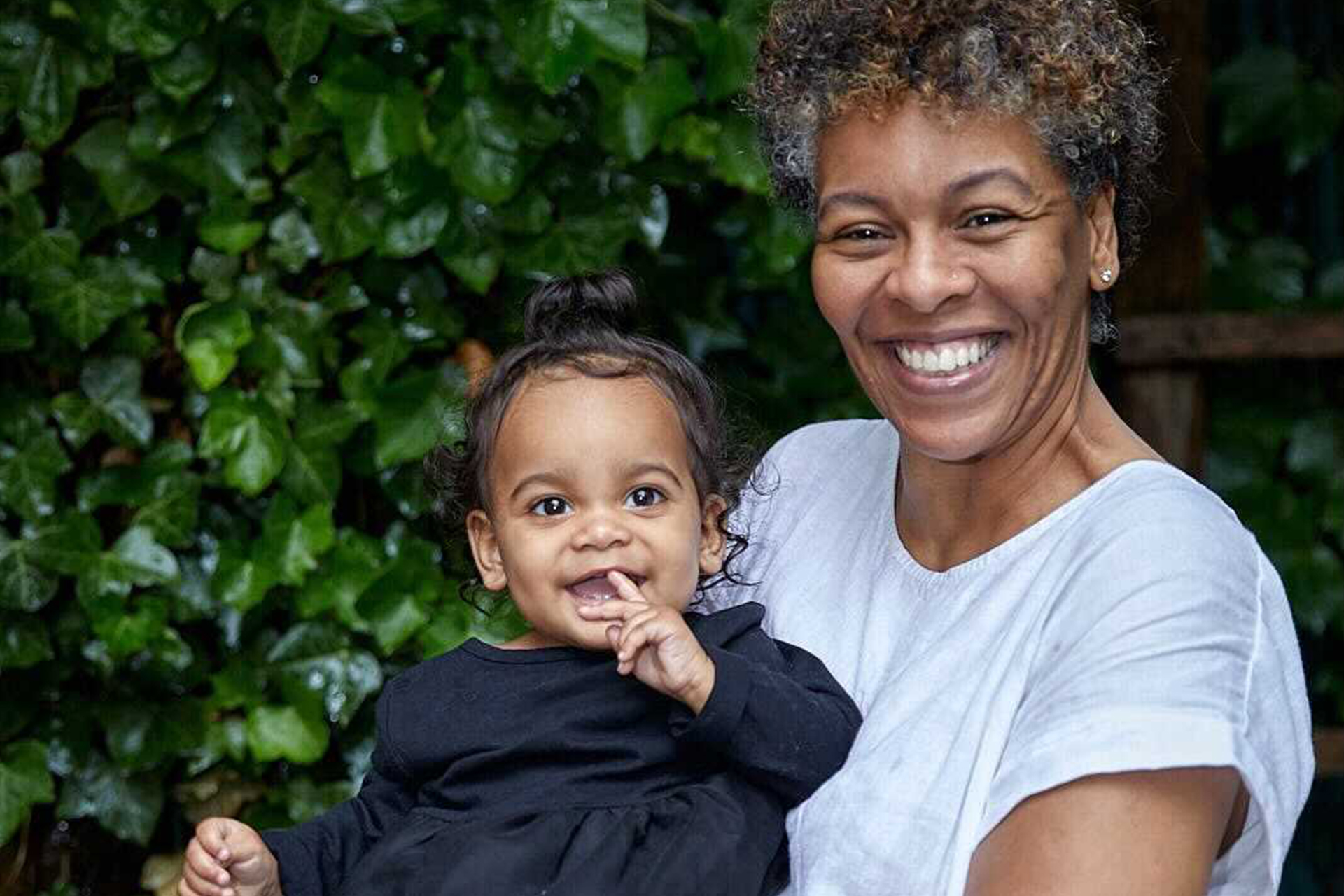Tracy McCarter won a small concession from Manhattan District Attorney Alvin Bragg Monday in a case alleging she murdered her estranged husband. But the DA’s office stopped short of dropping a murder charge for an act she says was in self-defense.
Bragg has been in the hot seat for how his office has handled the Upper West Side woman’s case, after he called her prosecution “unjust” during his campaign running as a progressive prosecutor set on reducing incarceration before taking office Jan. 1.
“I #StandWithTracy,” wrote Bragg in a September 2020 tweet. “Prosecuting a domestic violence survivor who acted in self-defense is unjust.”
At a hearing on Monday in Manhattan Criminal Court, prosecutors dropped their opposition to McCarter’s request to receive in-patient mental health services in Florida under advisement from her treatment team. She has been unable to leave New York City and is under electronic monitoring after being detained for six months on Rikers Island.
Up until Monday, Bragg’s office had opposed McCarter’s request to change the terms of her bail to allow her to leave the city to receive treatment for post-traumatic stress disorder and suicidal thoughts.
Despite the prosecution’s change of heart, Judge Melissa Jackson, who presided at the hearing, denied McCarter’s request to leave the state for treatment and set a new hearing for April 5, before a different judge.
Related coverage: Do police help or hurt domestic violence survivors? New York City council members take a stand
Although it’s a far cry from having the charges dropped, the prosecutors’ actions could signal a shift in how the new Manhattan District Attorney’s office, which plans to meet with McCarter’s defense team in the next two weeks, is approaching the high-profile case.
In court documents, McCarter, 46, and her legal team provided evidence that Murray got violent when he was drinking, and alleged that he once put her into a chokehold. McCarter declined to comment to THE CITY or The Fuller Project.
The grand jury that indicted McCarter under former District Attorney Cy Vance never heard about Murray’s alleged history of violence, or her claim that she was acting in self-defense. Judge Jackson later ruled that the grand jury was not required to know that information before making their decision.
If she’s convicted, McCarter — who welcomed her first grandchild while at Rikers — faces 25 years in prison.
Supporters of McCarter’s have been waiting for any sign that Bragg might decline to continue prosecuting her case.
Bragg’s office did not respond to requests for comment.
His silence since his election has deeply troubled McCarter’s supporters and family members, who say they feel misled.
“It feels like a bait and switch,” said Ariel Robbins, McCarter’s daughter. “You said that you don’t believe in her being prosecuted, and yet your office is prosecuting her, so what’s changed between then and now besides the fact that you’re in power?”
Wearing a ‘shackle’

When Bragg won, Robbins remembers feeling an overwhelming sense of joy because of the statement of support he made publicly. “To have him win felt like, wow, this is going to be over,” said Robbins. “This nightmare we have all been living for way too long, it’s finally going to be over.”
Instead, McCarter remains confined to New York City, and must wear an electronic ankle monitor, which Robbins refers to as her “shackle.”
Because her charges show up on a background check, she’s been unable to return to work as a nurse. And the judge’s ruling means that at least until April 5, she likely won’t be able to receive in-patient care, which has been recommended by her medical team.
Last week, McCarter was hospitalized for an incident related to her mental health.
At an early-March online town hall hosted by the People’s Coalition for Manhattan DA Accountability, Bragg was asked about McCarter’s case.
Bragg declined to comment on the case or his office’s decision to prevent McCarter from attending an inpatient mental health care facility out of state. “I can’t comment on an open case,” said Bragg, adding that criminalized survivors are “of significant profound importance to me and the person we brought in to run the trial division.”
For McCarter’s supporters at the town hall, his answer fell flat. “It’s been really disappointing as a community that cares about Tracy and about survivors… to see these promises have not yet come to fruition,” said Sojourner Rivers, an organizer with Survived and Punished NY.
Rivers acknowledges that Bragg has had a bumpy start to his term. In January, the new DA released a memo outlining new prosecution policies for the line prosecutors who handle cases, sparking the ire of law enforcement-aligned media and politicians.
Bragg later apologized for the memo and said he took “full accountability” for it being unclear and legalistic.
“I’m not so naive, Bragg is under a lot of pressure,” said Rivers. Yet, she added, “He chose to take on this role. He chose to say what he said about Tracy.”
On Twitter, supporters of McCarter’s have been echoing Rivers’ sentiments under the hashtag #DropHerCharges.
When he was campaigning, @AlvinBraggNYC claimed that it was unjust to prosecute a victim of domestic violence acting in self defense. Now in office, his actions don’t align with his earlier statement. Stay true to your word @ManhattanDA and #DropHerCharges. #StandWithTracy pic.twitter.com/g9c28Xc1Qb
— Emily Carter (@doubleEcarter) March 1, 2022
Bragg supporter Marissa Hoechsetter helps train New York DAs’ offices on gender-based violence and is a survivor of sexual violence. She served on Bragg’s transition team and now says she is frustrated at the pace of change.
“I want things to happen faster. And, I can only imagine what that feels like to somebody who’s in the position Tracy and her family are in,” said Hoechsetter before Monday’s hearing. “It’s important for the administration not to lose sight of these individual cases.”
Hoechstetter said that while she still supports Bragg, DAs’ offices aren’t incentivized to deal effectively with issues of gender-based and domestic violence. “I have an immense amount of respect for Alvin, and really was proud to endorse him,” said Hoechstetter. “I think there’s the person, Alvin. And then there’s the district attorney’s office.”
The race factor
Robbins believes that racism against her mother, who is Black, at least partly explains how prosecutors have handled her case. “I don’t think that you can talk about a case like this without talking about race. It’s just that obvious sort of factor that will always be at play,” she said.
McCarter’s estranged husband Murray was white. The prosecutor on her case, Sara Sullivan, is white, as are the current and future judges on her case, Melissa Jackson and Diane Kiesel, and until recently so was the district attorney.
“The system is responsive to perfect victims. Perfect victims are white, and straight, and cisgender, and middle class, and they don’t use drugs and they don’t have mental health issues, and they don’t talk back,” said Leigh Goodmark, a law professor and expert on criminalized survivors. “And, that’s who the system likes to help.”
“Black women are disproportionately represented among victims of violence who are arrested,” she added.
Nationally, less than 3% of Black women who kill white men were found to be justified, meaning they likely did not face charges, according to a 2014 analysis of national homicide data by the Urban Institute. That’s compared to 13.5% of white women who killed Black men.
In Texas, where Robbins lives, the reality that Bragg plans to press ahead with her mother’s case weighs heavily against the now-expectant mother.
“I’m four months pregnant, and we just thought this was gonna be over,” said Robbins. “And so, I’m trying to wrestle with the fact that my mom might not be present for me in the way that I imagined.”


 Jessica Washington
Jessica Washington
